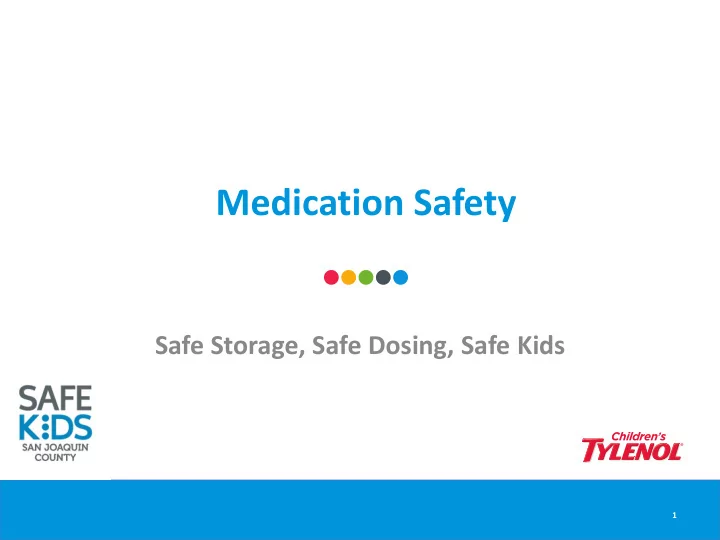

Medication Safety Safe Storage, Safe Dosing, Safe Kids 1
Why is it important? Nationwide… Every minute More than 67,000 children a parent or caregiver calls a are seen in emergency poison control center about departments for a medication poisoning medication poisoning 12,390 children are hospitalized each year for medication poisoning 2
San Joaquin County 63 children More than 800 children were hospitalized during were seen in emergency the same time period for departments for medication medication poisoning poisoning in the last 5 years It’s preventable 3
What can we do? • Store medicines safely • Give medicines safely • Get rid of expired or unused medicines safely • Talk to family and friends about medication safety 4
What is medicine? • Adult medicines and vitamins • Children’s medicines and vitamins • Eye drops • Diaper rash remedies 5
Store medicines safely • Keep medicines and vitamins up and away and out of sight, where children can’t see or reach them • Put medicines up and away after every use 6
Where is your medicine? • In your purse or backpack? • On a table or nightstand? • On kitchen or bathroom counters? • In low cabinets or drawers? 7
Set reminders 8
Store medicines safely • Store medicine in original container • Buy medicine in child-resistant packaging when available and close it tightly after each use 9
Give medicines safely • Read and follow the label • Know the active ingredients in your child’s medicine • Don’t give your child more than one medicine with the same active ingredient • Read the warnings, know the side effects, and understand when to stop taking the medicine and call a doctor 10
Give medicines safely • Check the dosing • Make sure you give the right dose at the right time • When measuring liquid medicine, use the dosing device that comes with the medicine you are giving • Teaspoon (tsp.) vs Tablespoon (tbsp.) 11
Avoid double dosing • Write down your child’s medicine schedule: • Child’s name • Date and time medicine should be given • Amount of medicine that should be given • If the scheduled dose was given 12
Getting help If you have questions about your child’s medicine, call the: Child’s Doctor Pharmacist Poison Control Center 1-800-222-1222 13
Get rid of medicines safely • Remove personal information and instructions from the medicine bottle or package • Put medicine into a sealable plastic bag • Add water to dissolve solid medicines like pills, tablets and capsules • Add kitty litter, sawdust or coffee grounds to the plastic bag 14
Drop-off sites Take medicines that are out of date and medicines you don’t use any more to a community drop -off site: San Joaquin County Household Hazardous Waste Facility 7850 R A Bridgeford St., Stockton Tracy Police Department 1000 Civic Center Dr., Tracy Walgreen’s Pharmacy 75 Ham Ln., Lodi 15
Take-back program National Prescription Drug Take Back Day (2 x yearly) • Local Police Departments and County Sheriffs’ Offices • Next Take Back Day: October 22, 2016 10:00 AM - 2:00 PM 16
Poison control centers Know the number – put it in your home and cell phones • 1-800-222-1222 When can you call the poison center? • 24 hours a day, 7 days a week • It’s free and confidential Who answers the poison center number? • Nurses, pharmacists, doctors and other poison experts Source: http://www.aapcc.org 17
Poison control centers When should you call the poison center? • If you have questions about giving medicine • If your child was given the wrong amount of medicine • If your child has taken medicine that he or she was not supposed to take When should you call 911? • If your child stops breathing • If your child collapses • If your child has a seizure Source: http://www.aapcc.org 18
Share the information Whose Medicine Are Kids Getting Into? • Grandparents – 48% • Parents – 38% 19
Share the information • Talk to caregivers, babysitters, and grandparents about storing and giving your child medicines safely • Ask guests and family members, especially grandparents, to keep their medicine up and away when they are visiting • Give a copy of your child’s medicine schedule to caregivers who will be giving your child medicine • Know the Poison Control Center phone number: 1-800-222-1222 20
Thank you! For more information, contact: Rachel Zerbo & Maribel Hernandez Safe Kids San Joaquin County (209) 468-2699 & (209) 468-8914 rzerbo@sjcphs.org mhernandez2@sjcphs.org 21
22
Recommend
More recommend